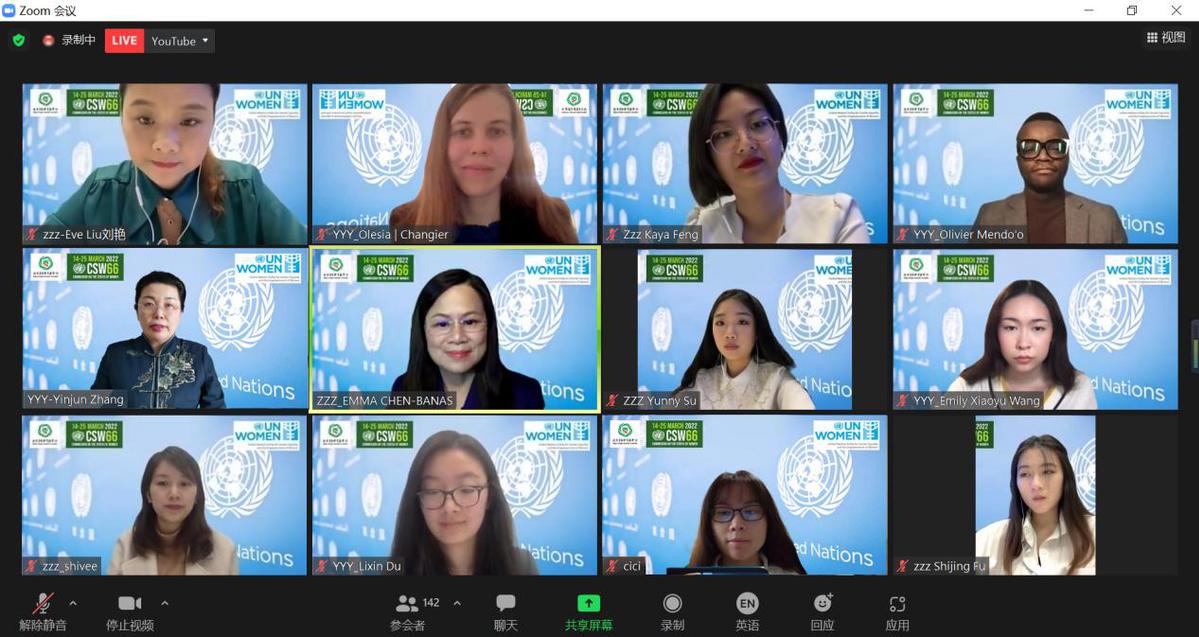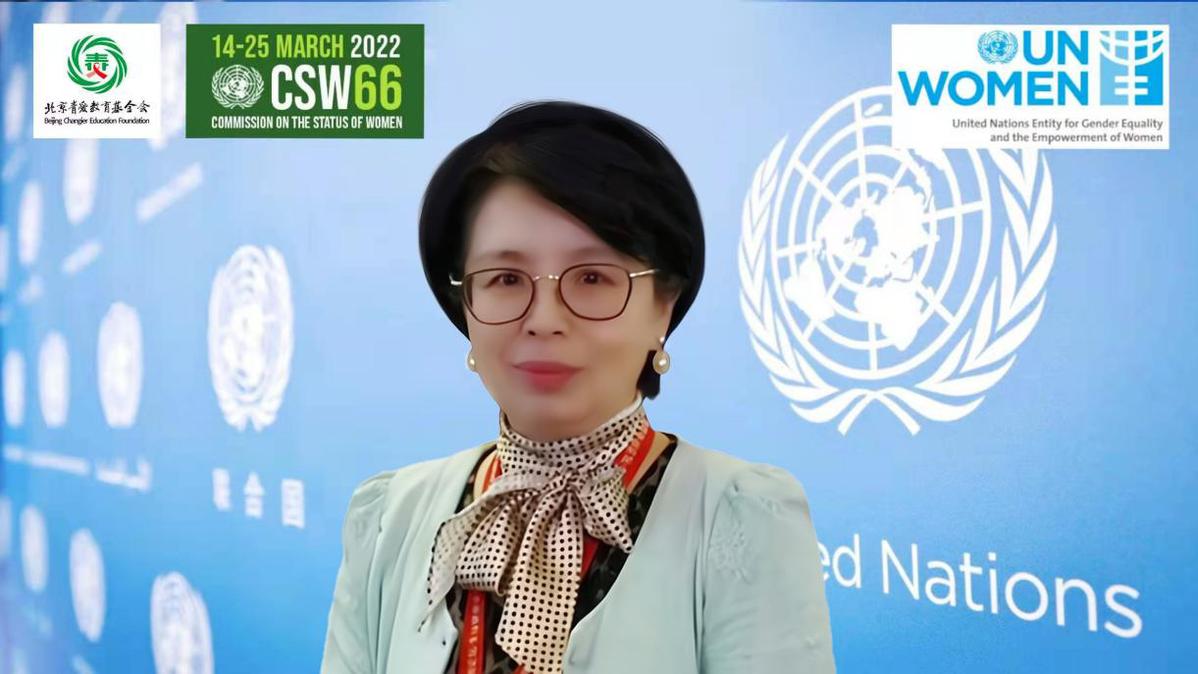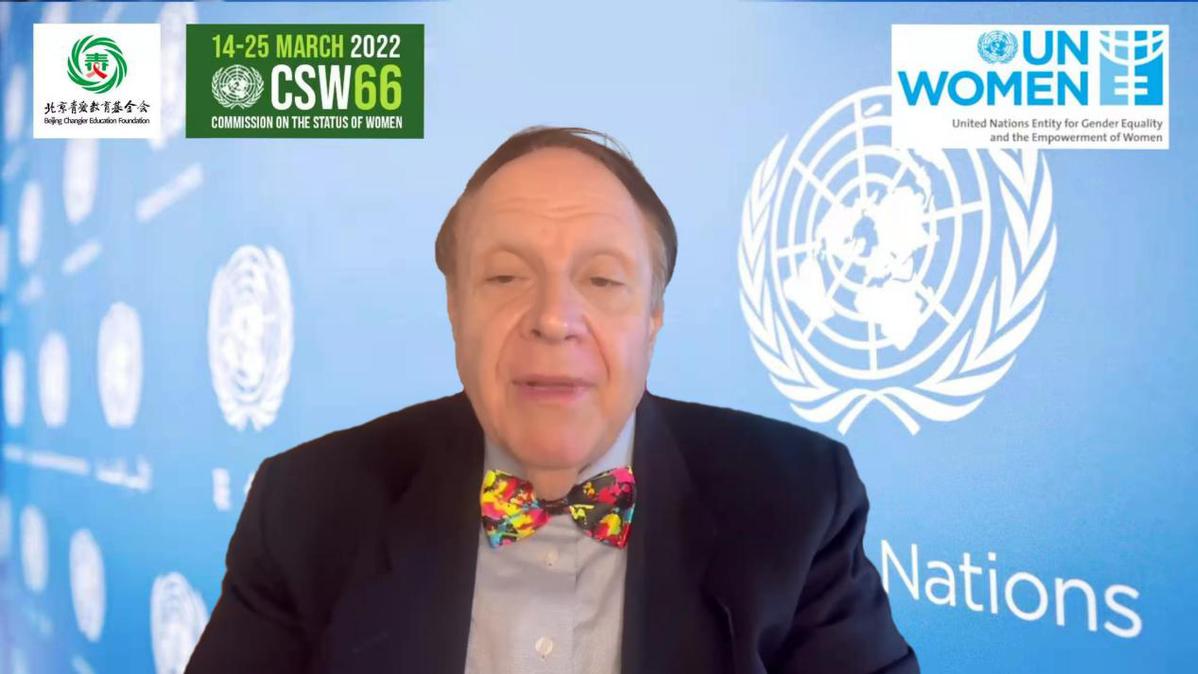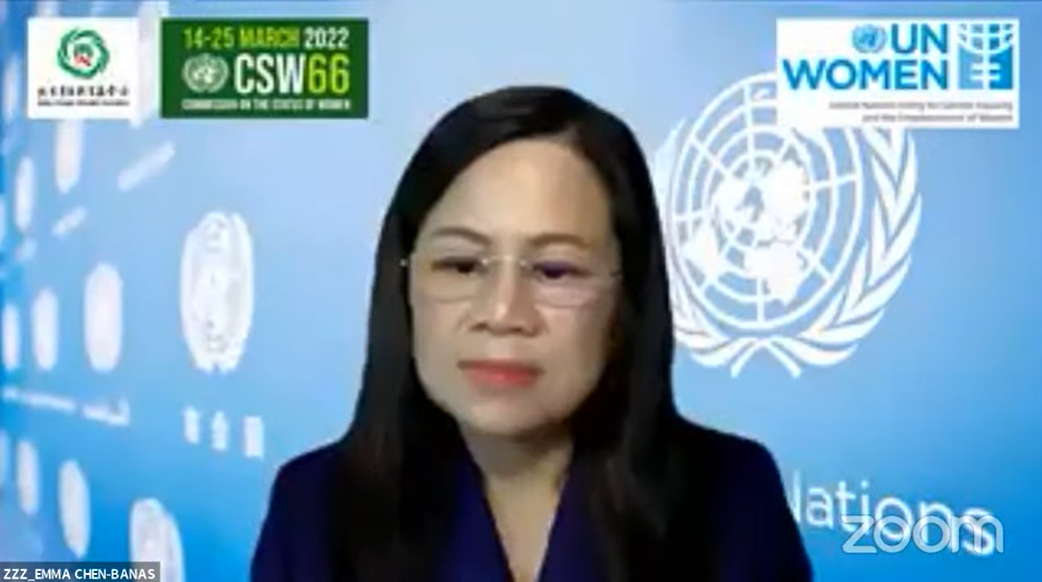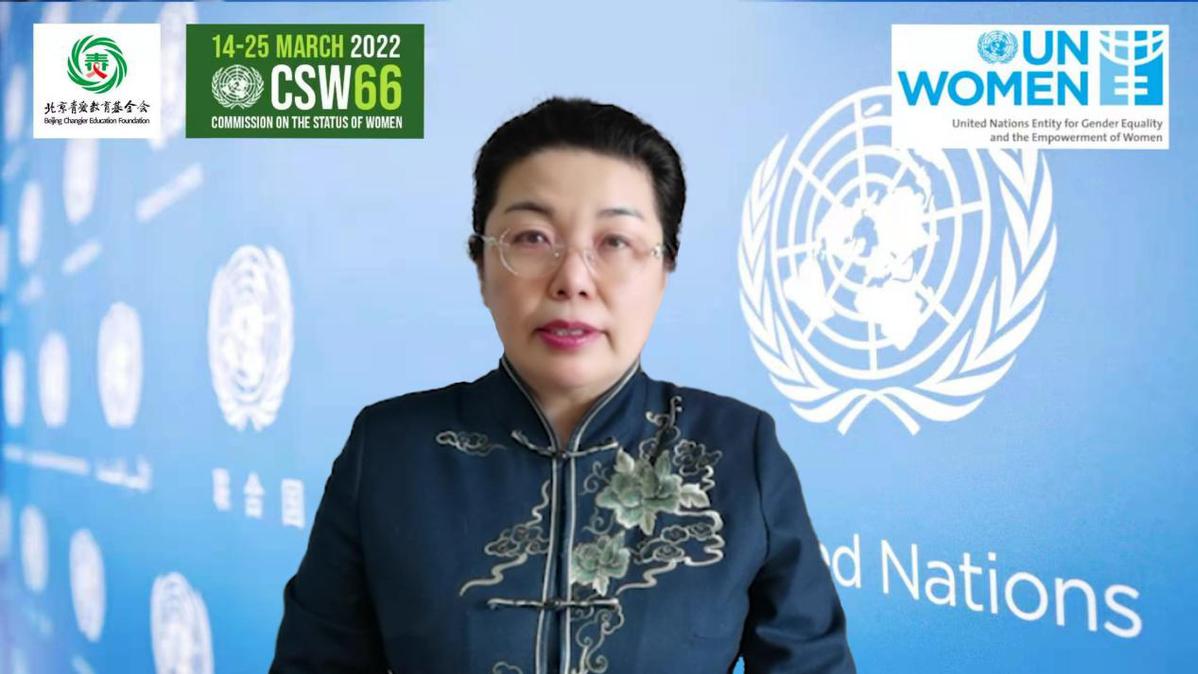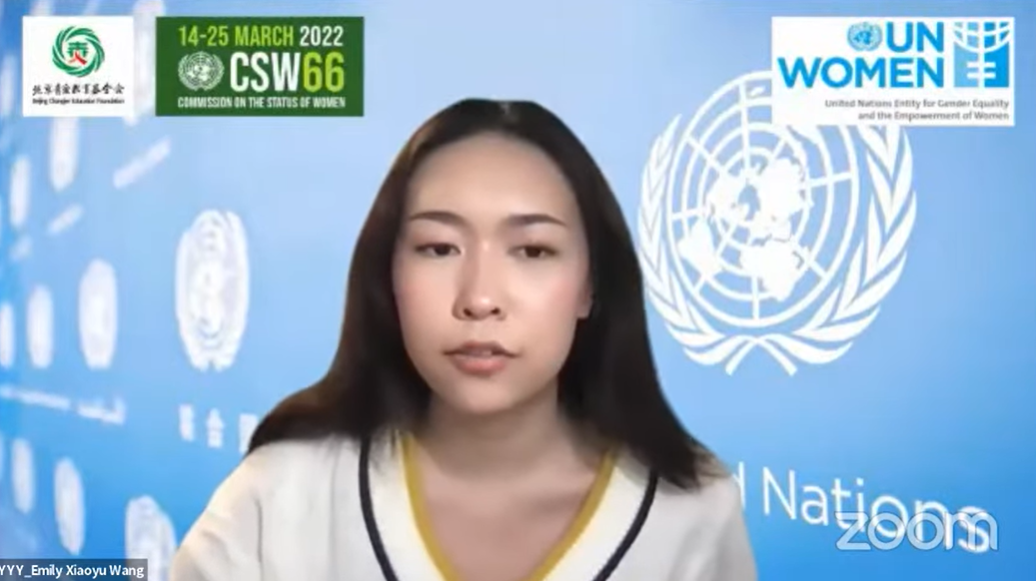Peking University, March 29, 2022: Beijing Changier Education Foundation, which has been granted ECOSOC special consultative status, held its second online side event during the Sixty-Sixth Session of the Commission on the Status of Women (CSW66) on March 19. Titled "Ending AIDS by 2030," the event saw experts, guests, and youth representatives discussing such topics as strengthening international cooperation on AIDS prevention and treatment, eliminating inequalities, and strengthening sex education for adolescents. Participants exchanged views on how the Chinese government and social organizations can help developing countries end AIDS by the scheduled in a Q&A format.
Ending AIDS requires a global coordination
Regarding the need to strengthen international cooperation in AIDS prevention and treatment, Chen Hong, director of the China-U.S CDC Collaboration Program Management Office, said that the Chinese government attaches great importance to AIDS prevention and treatment. China has participated in, benefited from, and promoted the comprehensive international AIDS prevention and treatment system and has made pioneering efforts to combine effective international experience in AIDS prevention and treatment with China's national conditions. The international community and organizations have also supported China's AIDS prevention and treatment, and positive results have been achieved. AIDS is a global epidemic disease that calls for the international community to join forces and make a joint response to challenges, especially during the period of tackling the COVID-19 pandemic. Policy coordination should be strengthened with rules established and resources and forces mobilized to end AIDS by 2030.
Chen Hong, director of the China-US CDC Collaboration Program Management Office. [Photo provided to China.org.cn]
Harvey Dzodin, a commentator for Chinese media and former vice president of ABC Television, echoed the same standpoint. He cited a British statesman, Lord Palmerston's statement that between countries, there are no permanent friends or enemies, only permanent interests. Health as a fundamental human right is a permanent interest for all nations and peoples. AIDS has been a serious public health issue facing the world for more than four decades and concerns the basic interests of the public. AIDS prevention and treatment, as an issue requiring a global response, requires enhanced international cooperation. International cooperation accelerated the eradication of smallpox, and the same applies to AIDS.In the face of global disease, countries around the world should pay attention not only to their own interests, but also to the overall interests of the international community. The world today is not so peaceful, he acknowledged, but stressing that he believe China and the United States can work together to find a way to defeat AIDS.
Harvey Dzodin, former vice president at ABC Television. [Photo provided to China.org.cn]
Emma Chen-Banas, U.N. representative and special director for North American Affairs of Beijing Changier Education Foundation, expressed that non-governmental organizations (NGOs) play important and unique roles in international cooperation in AIDS prevention and treatment. Beijing Changier Education Foundation is willing to share experience and provide support in this field for developing countries in Asia and Africa.
Emma Chen-Banas, U.N. representative and special director for North American Affairs of Beijing Changier Education Foundation. [Photo provided to China.org.cn]
Publicity and education are the most effective ‘social vaccines' to prevent AIDS
According to the Joint United Nations Programme on HIV/AIDS (UNAIDS), AIDS is the second leading cause of death among adolescents globally. Ending AIDS needs to start with protecting adolescents.
Regarding the continuing rise in AIDS infection among adolescents, Zhang Yinjun, director of the AIDS Prevention Education Project for Chinese Youth (APEPCY) Office and chairwoman of Beijing Changier Education Foundation, said that prevention is the key to AIDS prevention and treatment. In the absence of an effective vaccine and cure, universal sex education and humanistic education are the most important means to curb the spread of AIDS, as well as the most economical and effective social vaccines. All adolescents have the right to access information and services to protect themselves from HIV. The "Campaign of Sex Education and Humanistic Education to End AIDS" launched by Beijing Changier Education Foundation will popularize and promote knowledge of AIDS prevention and treatment. The campaign aims to ensure that more adolescents grow up free from sexual assault and discrimination, have access to HIV testing, HIV prevention and treatment programs and sexual and reproductive health services, and truly enjoy their rights to life and health.
Zhang Yinjun, chairwoman of Beijing Changier Education Foundation. [Photo provided to China.org.cn]
"Sex education is crucial to stopping the spread of HIV and ending AIDS," said Emily Xiaoyu Wang, a youth representative and a 17-year-old Chinese student studying abroad. "One of the core causes of the HIV pandemic among adolescents is a lack of sex education.Due to a lack of sex education, adolescents will try to have sex without safe prevention measures, and the widespread use of social software, the abuse of new synthetic drugs, and other factors increase the risk of AIDS infection and the complexity of its prevention and treatment. Therefore, transparent, scientific, and high-quality sex education should be provided for adolescents to help them enhance the sense of responsibility and establish correct values."
Emily Xiaoyu Wang, youth representative. [Photo provided to China.org.cn]
Tackling AIDS requires eliminating gender inequalities
The continuing spread of the COVID-19 pandemic has affected the progress of global AIDS prevention and treatment, especially the progress of achieving equality.
Regarding the fact that inequalities are exacerbating the spread of AIDS, a PhD candidate at Peking University, research assistant to the Center for African Studies Peking University, head of Delegation of the African Youth in China, co-founder of the China-Africa Youth Federation (CAYF), and chief international volunteer of Changier, said, "The pandemic has widened the gap between men and women in wealth, income, access to services and rights. In sub-Saharan Africa, young women aged 15-24 are twice as likely to be infected with HIV as men of the same age. Gender inequality leads to barriers for women and girls in accessing AIDS prevention and treatment as well as sexual and reproductive health services. To end the AIDS epidemic, we must change the status of women and girls. We must stop gender-based violence, end inequality and insecurity, and ensure women's equal access to education, employment, and health services."
Joseph Olivier Mendo'o, chief international volunteer of Changier
More than 170 experts and scholars, NGO representatives, teacher representatives, and youth representatives from home and abroad attended the event.
Since Beijing Changier Education Foundation obtained an ECOSOC special consultative status in 2019, it has actively exercised its consultative rights and obligations, carried out non-governmental diplomacy, and established a communication mechanism with U.N. agencies in China; has attended international conferences to share practices and experience in AIDS prevention and treatment among adolescents; and has made foreign donations to support AIDS prevention and control in African countries and made positive efforts to help achieve the UN Sustainable Development Goals (SDGs).
